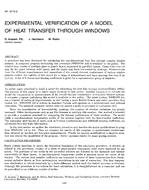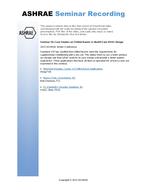This paper is concerned with the heat flows and thermal bridging in metal-framed structures and practical steps to minimize these. It arose from product development work to find economic solutions that meet specified insulation levels. Some strategies for counteracting thermal bridging have been found to be more effective than others. For example, the application of a complete layer of low conductivity material at the boundary of a bridged zone is usually much more effective than use of local thermal breaks. In some cases, the contact resistance between metal and other parts has been found to be a significant factor° Ways to increase these contact resistances have been tested, and these measurements have produced some features that are superficially anomalous but in fact entirely consistent. For example in some joints the insertion of a small thermal insulating break increases the heat flow, as a result of better contact with the metal outweighing the added thermal resistance of the insert. This paper discusses both the strategies for counteracting thermal bridging effects and the observed contact resistances of a range of real metal joints.
Units: SI
Citation: Symposium, ASHRAE Transactions, 1988, vol. 94, pt. 2, Ottawa
Product Details
- Published:
- 1988
- Number of Pages:
- 16
- File Size:
- 1 file , 1 MB
- Product Code(s):
- D-OT-88-15-4


